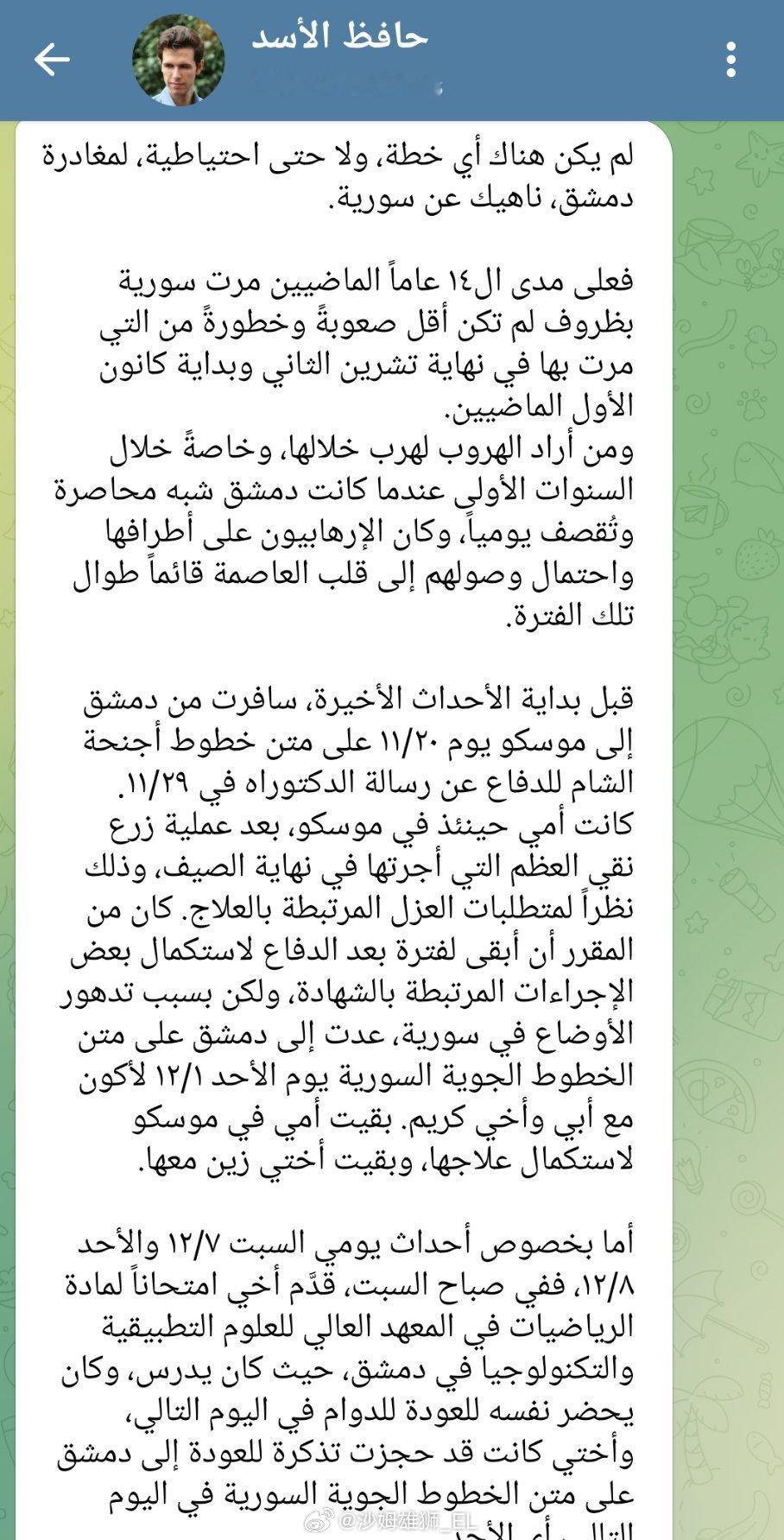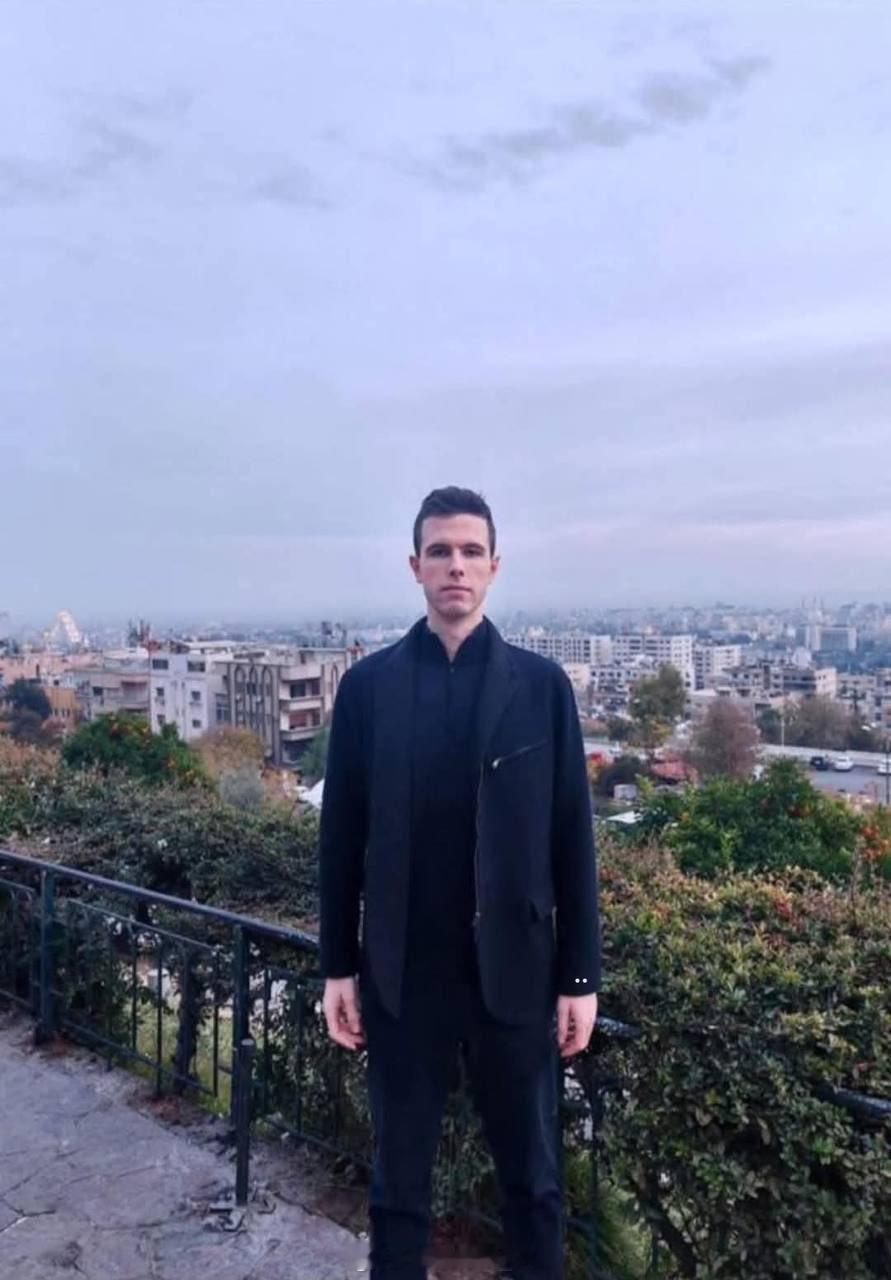关于所谓巴沙尔·阿萨德之子哈菲兹·阿萨德发布的“大马士革最后时刻”的故事,内容具有一定的逻辑性,不过发布来源的真实性存在极大疑问(先是X,被封号后又发到TG)。因为哈菲兹几乎不太可能专门开个号就发个大篇;更不必说其使用的“在大马士革的照片”实际上是一张老照片,如果是他本人所发,应该会附上2024年最后一段时间的照片。
他的大篇原文(英文版):
There was never a plan—not even a backup—to leave Damascus, let alone Syria.
Over the past 14 years, Syria has endured hardships and dangers no less severe than those of late November and early December. Anyone intending to flee would have done so long ago, particularly in the early years when Damascus faced near siege, daily bombardment, and the constant threat of terrorists reaching its centre.
Before everything unfolded, I travelled from Damascus to Moscow on November 20 via Cham Wings Airlines to defend my doctoral dissertation on November 29. At the time, my mother was in Moscow following a bone marrow transplant she had undergone at the end of summer, which required isolation as part of her treatment. I had planned to stay longer after my defence to complete certain certification procedures, but as the situation in Syria deteriorated, I returned to Damascus on Sunday, December 1, aboard Syrian Air to be with my father and brother, Karim. My mother remained in Moscow to continue her treatment, with my sister, Zein, staying by her side.
Regarding the events of Saturday, December 7, and Sunday, December 8:
On Saturday morning, my brother sat for a mathematics exam at the Higher Institute for Applied Sciences and Technology in Damascus, where he was studying. He was preparing to resumees the next day. Meanwhile, my sister had booked a ticket to return to Damascus on Sunday, December 8, aboard Syrian Air.
On Saturday afternoon, rumours began circulating that we had fled the country. Several people reached out to confirm whether we were still in Damascus. In response, I took a picture at Al-Nairabain Park in Al-Muhajireen neighbourhood and shared it on my (now closed) private Instagram account. Not long after, some social media pages picked up the picture and began circulating it.
Until then, despite the distant sounds of shelling, nothing seemed unusual—just the familiar reality we had grown accustomed to since the early years of the war. The situation remained unchanged as the army prepared to defend Damascus, showing no signs of the subsequent deterioration—until the sudden and unexpected news of the army’s withdrawal from Homs, mirroring earlier withdrawals from Hama, Aleppo, and Idlib countryside. Even then, there were no preparations for departure, nor any indication that we would be leaving. That changed after midnight when a Russian official arrived at our home in Al-Malki neighbourhood. He conveyed a request for the President to relocate to Latakia for a few days due to the severity of the situation in Damascus and to facilitate the oversight of the battles, which were still ongoing on the coastal and Al-Ghab Plain fronts.
As for the claim that we left without informing my cousins, who were in Damascus at the time, I was the one who called them multiple times as soon as we knew we were relocating. Shortly afterward, we learned from their household staff that they had left for an unknown destination.
After a short time, we headed toward Damascus International Airport, arriving around 3a.m., where we were joined by my uncle, Maher. We found the airport deserted, with no staff present, including at the control tower. We then boarded a Russian military aircraft to Latakia, landing at Hmeimim Airport before dawn.
In the early hours of Sunday morning, we were supposed to head to the presidential retreat in the Burj Islam area, which is over 40 kilometres from the airport by road. However, all attempts to reach anyone there were unsuccessful, as every phone we tried was turned off. We soon began receiving reports of military withdrawals from the frontlines, and the fall of the last remaining positions. At the same time, a series of drone attacks began targeting the base, accompanied by both close and distant gunfire in the surrounding area; this situation continued throughout our stay.
In the afternoon, the base command briefed us on the gravity of the situation nearby. They informed us that leaving the base was no longer an option, as terrorists had spread through the country, the situation had descended into chaos, and all communication with military leadership had been lost. After consulting with Moscow, the base command informed us that our transfer to Russia had been requested. Some-time after, we boarded a Russian military aircraft bound for Moscow, where we landed later that night.



